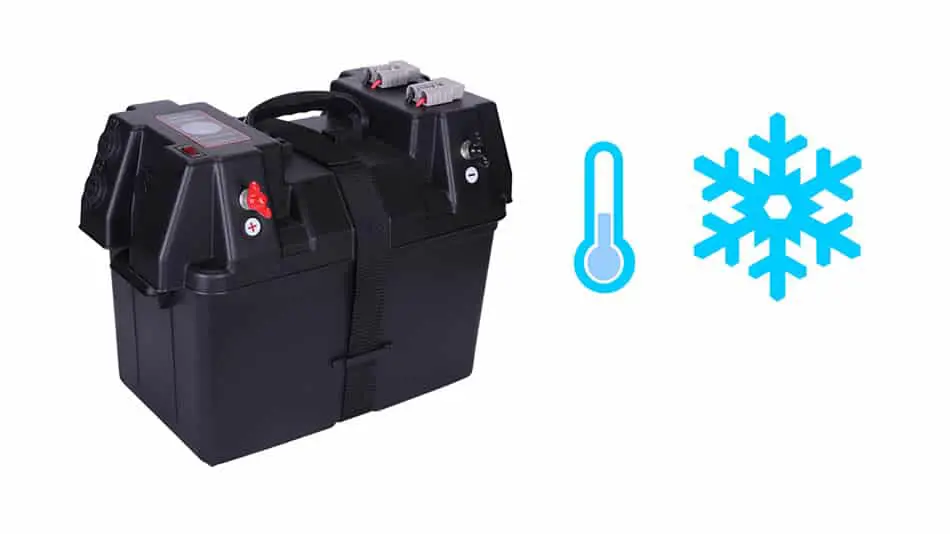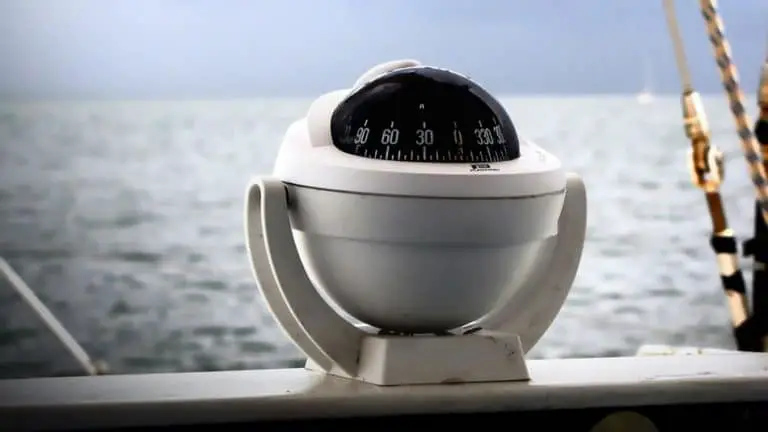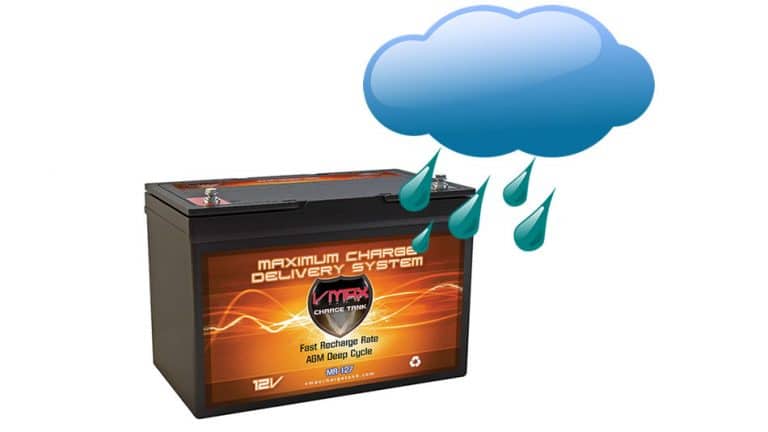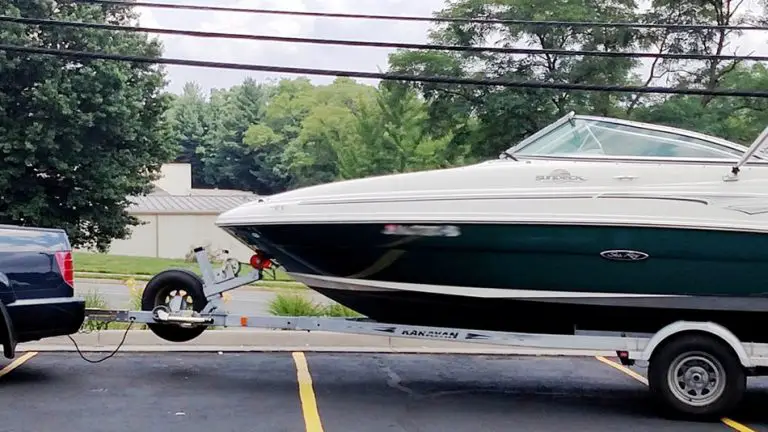Can a Boat Battery Freeze – Winterizing Marine Batteries
With winter now upon us, one of the questions you might all be asking yourself is whether or not a boat battery can freeze, and what should you be doing about it?
The answer is: Boat batteries can freeze. In fact, any battery can freeze if it gets cold enough. If a boat is being left for more than a few days in freezing conditions, a trickle charger should be placed on the battery. Cold temperatures will slowly drain and damage most batteries over time.
This is the marine trickle charger I like (on Amazon). It’s a smart charger so you don’t have to worry about it over-charging. If you can’t get an extension cord to reach the boat, remove the battery from the boat and leave it charging in the garage for the winter.
The information below will tell you everything that you need to know so you can properly take care of your boat’s battery during the off-season of the winter months.
Understanding What Type Battery You Have
There are three types of marine batteries, wet-cell, gel cell, and absorbed glass mat. Understanding which type of battery you have is important so you can determine how to best care for it in the winter.
Wet-cell batteries are the most popular amongst boaters because the liquid sulfuric acid electrolyte allows the battery to store a large amount of electricity. Wet-cell batteries can be popped open at the top to add distilled water since the electrolyte tends to dry out.
These types of batteries need to remain upright to prevent the dangerously corrosive liquid from spilling out. Also, fun fact, the wet-cell battery was the first type of rechargeable battery.
Gel cell batteries also use sulfuric acid, except here it is mixed with a fumed silica, to make up a jellified electrolyte. The gel cell battery doe not have to be kept upright, unlike the wet-cell battery. The manufacturer will also seal these batteries shut, since opening the top to add distilled water would have no effect or benefits.
Absorbed glass mat batteries or AGM, have ultra-fine fiberglass separators inside that are infused with sulfuric acid electrolyte. AGM batteries can sit in storage for several months without needing a recharge, allowing them to hold a charge much longer than wet-cell and gel cell batteries.
AGM batteries can deliver a high current when required, making them an ideal choice amongst boaters. These types of batteries are virtually spill-proof and can be placed in any position.

Can a Boat Battery Freeze?
The answer is yes; a boat battery can freeze; however, there are different conditions for each of the different types of marine batteries.
All batteries have a freezing point, but some are more prone to being damaged after freezing than others. For example, a fully charged wet-cell battery is capable of withstanding extremely cold temperatures before freezing. However, if the wet-cell battery gets fully discharged, it could begin to freeze right around the freezing level. And if that happens, the battery is ruined.
Gel cell batteries can last a little longer in extremely cold temperatures if fully charged before freezing. Keeping a full charge on the battery and monitoring it will help avoid them from freezing. If these batteries freeze, you might be able to revive them, however in most cases they are probably going to be ruined.
Absorbed glass mat batteries fully charged can withstand the coldest out of them all. A frozen absorbed glass mat battery will put out very little or no output, but at least they will not be ruined like the wet-cell battery if it freezes. When they have thawed out, AGM batteries can be restored with a charge.
The bottom line, if your battery has to be out in the cold, you should make sure that it is fully charged first, so it takes more to freeze.
How To Store a Boat Battery For The Winter
Now that you know a boat battery can freeze let’s talk about how you can go about storing one for the winter.
The best way to store a boat battery for the winter is to remove it from the boat and store it in a cool, dry place, such as a basement or workshop. It no longer matters if you store the battery directly on the concrete floor, or if you set it on top of the block of wood. With the way batteries are built today, you can almost store them anywhere.
The key to remember is that you want to make sure the battery has a full charge before putting it in storage. Keep an eye on the battery throughout the time that it’s in storage to double-check that the charge is remaining full. Plug them in and charge them if needed.
Some people use a three or four-stage smart charger to monitor the battery charge. With the smart charger, if the battery life drops down to let’s say 80 percent, then the charger will automatically turn on to bring the battery back up to a full charge. Once it reaches 100 percent again, it will shut off and remain in standby monitoring the battery once again.
Not all charges are created equal. Before you purchase a charger, confirm whether or not it is designed to handle the type of battery that you have. For example, wet-cell batteries and absorbed glass mat batteries demand different types of chargers and algorithms.
Can a Deep Cycle Battery Freeze?
A fully charged deep cycle battery could withstand temperatures of -92°F before freezing. That is the temperature when the electrolyte would begin to freeze. A partially discharged lead-acid battery with a charge of 40 percent, however, would begin to freeze at -16°F.
By keeping the battery at a full charge throughout the winter, the electrolyte is less likely to freeze.
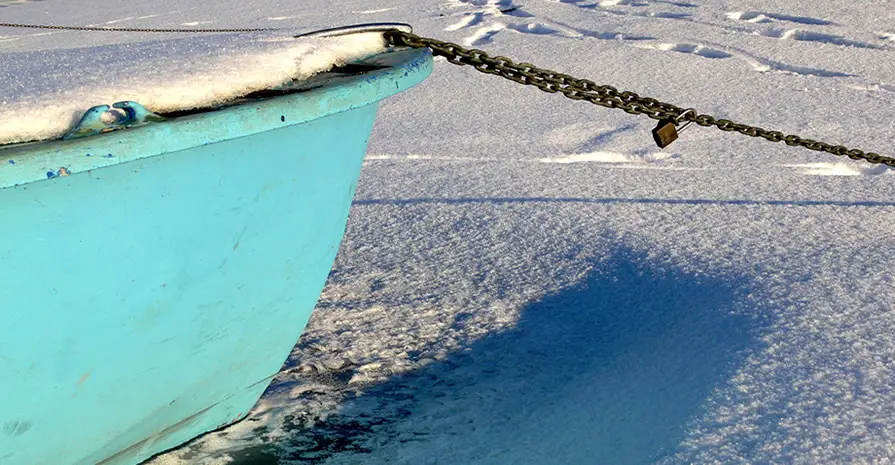
How Do I Keep My Battery From Freezing?
To help prevent your batteries from freezing, you should keep them topped up with a full charge. A fully charged battery can withstand much colder weather then a partially discharged battery.
I’ve owned a few trickle chargers that overcharged the battery, or at some point failed and ruined a battery. This is the smart trickle charger that I recommend for marine batteries. It will save you money to have a reliable one that will never damage your battery.
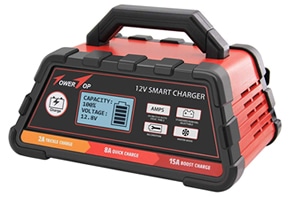
If you do use a trickle charger, I recommend using one that has an automated self shut-off feature, or “float” mode. Otherwise, you will need to manually keep an eye on the battery and unplug the trickle charger when the battery reaches a full charge. Overcharging a battery could ruin it.
Should I Disconnect My Boat Battery?
Before storing your boat for the winter, you should disconnect the battery. You might not know it, but on many boats, even with the power switch to off, the battery could still draw power from different objects such as a radio, clock, fish finder, etc. Over time these will slowly cause the battery to discharge.
If you have the option, it’s best if you could remove the battery from the boat and store it indoors in a nice cool, dry area. It is important to remember that anytime you are storing a battery, you should first make sure that it has a full charge. A fully charged battery won’t freeze as easily as a discharged battery.
The only time you do not want to disconnect the battery is if you’re storing your boat in the water. The reason for this is because you do not want to take power away from the bilge pump; otherwise, the next time you go looking for your boat it could be sitting at the bottom of the water still tied to the dock.
For more information on disconnecting the battery, I recommend taking a look at the article I wrote called Should I Disconnect The Boat Battery.

Winterizing a Marine Battery
Just like when you winterize your boat motor, you should also winterize your battery.
- Look for damage
Inspect the battery case for cracks and any other signs of damage. If the battery case does have a crack, you should replace the battery. If you have a wet-cell battery, you will also need to open the top of the battery and fill it with distilled water to bring the electrolyte level back up.
- Clean the battery
Using a clean cloth, wipe any dirt or mud from the battery. Funny enough, a dirty battery could discharge fairly quick. Next, mix up some baking soda and water and wipe around the negative and positive terminals.
- Maintain a full charge
With the battery fully charged, find a cool, dry, safe location to store the battery. Every three to four weeks, check on the battery and top up the charge as needed. If you are using something like a three or four-stage smart charger, you shouldn’t have to check on the battery all that often as the charger will monitor it for you and keep it topped up with a full charge.
What Happens If a Deep Cycle Battery Freezes?
If a deep cycle battery freezing, that means the sulfuric acid and distilled water is not properly mixed, which causes the distilled water to solidify and damage the battery. When the distilled water freezes, it could also expand and crack the battery case.
Never attempt to jump start or charge a frozen battery. The best thing to do is to inspect the battery case and look for any signs of cracking. If you see cracks, the battery might be damaged to the point where it will need replacing. If you can not see any signs of cracking, bring the battery into a nice warm place where it can thaw. Never attempt to speed up the thawing process by placing a frozen battery in front of a space heater or stove.
When a battery case cracks, the battery is pretty much ruined, and you should replace it. The reason for this is because a battery could produce hydrogen gas inside of the case, and when there is a crack, small amounts of this gas could escape. If hydrogen gas builds up and there is a spark, the battery could explode.
Recommended
Should I Disconnect My Boat Battery
Why Your Boat Battery Keeps Dying And What You Can Do

